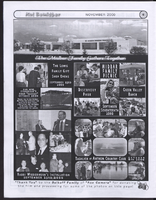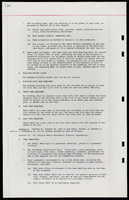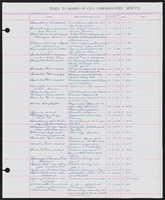Search the Special Collections and Archives Portal
Search Results

Michael Dimengo and Rabbi Yocheved Mintz at the Pulse Nightclub (Orlando, Florida) mass shooting vigil at the Gay and Lesbian Community Center, Las Vegas, Nevada: digital image
Date
Archival Collection
Description
Image
Jewish Community Center of Southern Nevada
The Jewish Community Center of Southern Nevada is a nonprofit organization that offers programs and activities that focus on Jewish culture, identity and values. It is located in Las Vegas, Nevada and is a partner of the Jewish Federation of Las Vegas.
Corporate Body

Transcript of interview with Beth Molasky by David Shwartz, June 2, 2014
Date
Archival Collection
Description
In this interview, Molasky discusses her parents, Irwin and Susan Molasky, and growing up in Las Vegas as a member of Temple Beth Sholom. She attended Sunday school and Hebrew school, but is not particularly religious as an adult.
Beth Molasky-Cornell is a partner, shareholder, and an active member of the board of directors of the Molasky Group of Companies, which was founded by her father Irwin Molasky. She is a founding partner and a core member of the board of directors of Ocean Pacific Companies, a high-end real estate development firm founded by her husband Ken Cornell in San Diego, California. Molasky-Cornell contributed to numerous Molasky Group building projects, including the Bank of America Plazas, the Winterwood Corporation land development, and the Park Towers luxury condominiums. Molasky was born in Florida; however, her family moved to Las Vegas before her second birthday. She graduated from Valley High School in 1968, and started college at the University of Southern California at the age of seventeen. After spending a couple of years in Rhode Island, where she had her children, she moved back to Las Vegas in 1975. In this interview, Molasky discusses her childhood experiences in Las Vegas, especially as a member of the Jewish community, and reflects upon changes that influenced her children?s upbringing in the city.
Text
Emily Persaud-Zamora oral history interview
Identifier
Abstract
Oral history interview with Emily Persaud-Zamora conducted by Cecilia Winchell and Stefani Evans on January 17, 2023 for the Reflections: the Las Vegas Asian American and Pacific Islander Oral History Project. In this interview, Persaud-Zamora remembers growing up in Queens, New York and being exposed to numerous cultures and ethnicities. Though her parents separated when she was two, Persaud-Zamora maintained a steady relationship with both. Her mother was originally from Brazil and worked as a chef, primarily for private homes. Her father was an immigrant from Guyana, with roots in India, and did catering for large events and eventually moved to Georgia. Growing up she recalls being between two worlds, never feeling quite Brazilian enough or Asian enough, but still being connected to her Hindu roots in various ways. When she was fifteen, Persaud-Zamora and her mother moved to Las Vegas, Nevada, where she continued high school and describes the cultural differences between the two places she had lived. After high school, she received a degree in political science and ended up working in public policy. Her current position at Silver State Voices involves work with many different organizations across Nevada to advocate for progressive issues and underrepresented communities. Throughout the interview, Persaud-Zamora touches on a number of other issues, including her religion, traditions, and family.
Archival Collection

June Monroe and Kazuko Atomura oral history interview: transcripts
Date
Archival Collection
Description
Oral history interviews with June Monroe and Kazuko Atomura conducted by Cecilia Winchell and Stefani Evans on July 14 and July 19, 2022 for Reflections: the Las Vegas Asian American and Pacific Islander Oral History Project. In the first interview, Kazuko Atomura describes her childhood in Taiwan and Tokyo, Japan, and shares both happy and difficult mememories of that time. Atomura eventually moved to Los Angeles, California, where she reconnected with a man she previously met in Japan. She married him and together had their daughter, June Monroe, and another son while living in Corpus Christi, Texas. After difficult medical procedures involving Atomura's husband and Monroe's younger brother, Brian, the family relocated to Las Vegas, Nevada. Monroe recalls attending Las Vegas High School and Bonanza High School, and the struggle of making new friends as a young person. In the second interview, the mother and daughter discuss racism, discrimination, and identity. Kazuko Atomura recalls her many experiences with discrimination as a result of both her appearance and language barriers. June Monroe discusses how she came to be proud of her Japanese heritage, while Atomura discusses some of the community activities she has been involved in since living in Las Vegas including the Japanese Culture Club and odori dancing. Then, both Atomura and Monroe discuss Monroe's brother, Brian, who received two kidney transplants; one from Monroe's father and one from Monroe herself. Atomura talks about the shrines she has built for Brian, the experience of him being on dialysis, care taking, and his final days. Monroe shares about her activism with organ donation, being regularly involved with the Nevada Donor Network and helping to pass significant pieces of legislation within the area of organ donation.
Text





